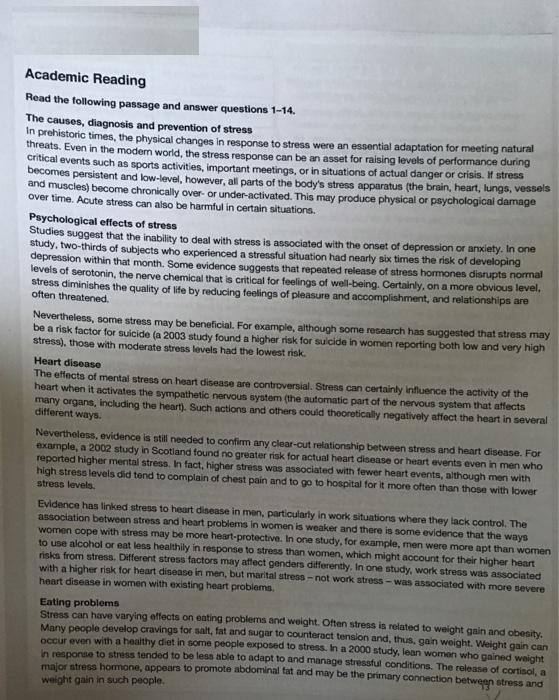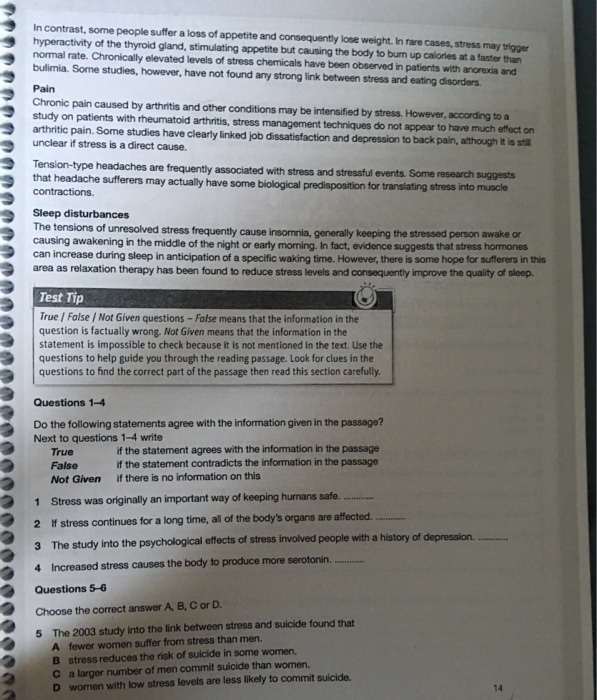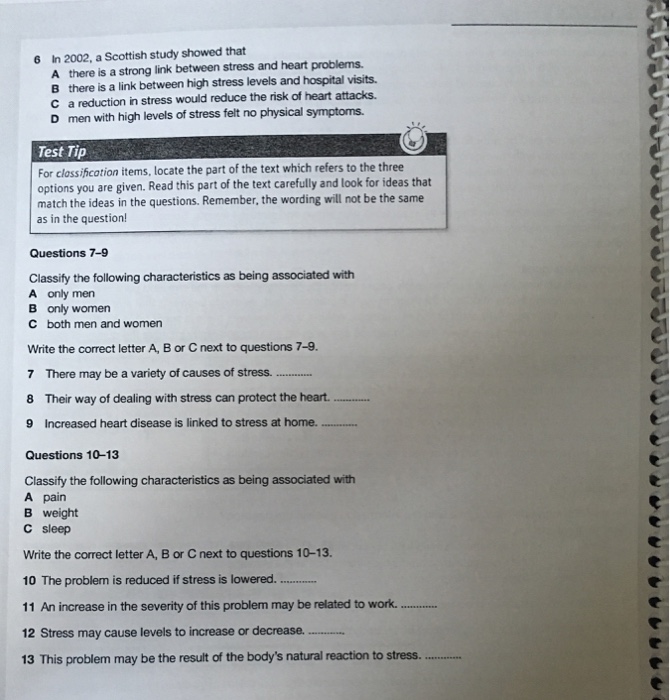Academic Reading Read the following passage and answer questions 1-14. The causes, diagnosis and prevention of stress In prehistoric times, the physical changes in



Academic Reading Read the following passage and answer questions 1-14. The causes, diagnosis and prevention of stress In prehistoric times, the physical changes in response to stress were an essential adaptation for meeting natural threats. Even in the modern world, the stress response can be an asset for raising levels of performance during critical events such as sports activities, important meetings, or in situations of actual danger or crisis. If stress becomes persistent and low-level, however, all parts of the body's stress apparatus (the brain, heart, lungs, vessels and muscles) become chronically over- or under-activated. This may produce physical or psychological damage over time. Acute stress can also be harmful in certain situations. Psychological effects of stress Studies suggest that the inability to deal with stress is associated with the onset of depression or anxiety. In one study, two-thirds of subjects who experienced a stressful situation had nearly six times the risk of developing depression within that month. Some evidence suggests that repeated release of stress hormones disrupts normal levels of serotonin, the nerve chemical that is critical for feelings of well-being. Certainly, on a more obvious level, stress diminishes the quality of life by reducing feelings of pleasure and accomplishment, and relationships are often threatened. Nevertheless, some stress may be beneficial. For example, although some research has suggested that stress may be a risk factor for suicide (a 2003 study found a higher risk for suicide in women reporting both low and very high stress), those with moderate stress levels had the lowest risk. Heart disease The effects of mental stress on heart disease are controversial. Stress can certainly influence the activity of the heart when it activates the sympathetic nervous system (the automatic part of the nervous system that affects many organs, including the heart). Such actions and others could theoretically negatively affect the heart in several different ways. Nevertheless, evidence is still needed to confirm any clear-cut relationship between stress and heart disease. For example, a 2002 study in Scotland found no greater risk for actual heart disease or heart events even in men who reported higher mental stress. In fact, higher stress was associated with fewer heart events, although men with high stress levels did tend to complain of chest pain and to go to hospital for it more often than those with lower stress levels. Evidence has linked stress to heart disease in men, particularly in work situations where they lack control. The association between stress and heart problems in women is weaker and there is some evidence that the ways women cope with stress may be more heart-protective. In one study, for example, men were more apt than women to use alcohol or eat less healthily in response to stress than women, which might account for their higher heart risks from stress. Different stress factors may affect genders differently. In one study, work stress was associated with a higher risk for heart disease in men, but marital stress-not work stress-was associated with more severe heart disease in women with existing heart problems. Eating problems Stress can have varying effects on eating problems and weight. Often stress is related to weight gain and obesity. Many people develop cravings for salt, fat and sugar to counteract tension and, thus, gain weight. Weight gain can occur even with a healthy diet in some people exposed to stress. In a 2000 study, lean women who gained weight in response to stress tended to be less able to adapt to and manage stressful conditions. The release of cortisol, a major stress hormone, appears to promote abdominal fat and may be the primary connection between stress and weight gain in such people. In contrast, some people suffer a loss of appetite and consequently lose weight. In rare cases, stress may trigger hyperactivity of the thyroid gland, stimulating appetite but causing the body to burn up calories at a faster than normal rate. Chronically elevated levels of stress chemicals have been observed in patients with anorexia and bulimia. Some studies, however, have not found any strong link between stress and eating disorders. Pain Chronic pain caused by arthritis and other conditions may be intensified by stress. However, according to a study on patients with rheumatoid arthritis, stress management techniques do not appear to have much effect on arthritic pain. Some studies have clearly linked job dissatisfaction and depression to back pain, although it is still unclear if stress is a direct cause. Tension-type headaches are frequently associated with stress and stressful events. Some research suggests that headache sufferers may actually have some biological predisposition for translating stress into muscle contractions. Sleep disturbances The tensions of unresolved stress frequently cause insomnia, generally keeping the stressed person awake or causing awakening in the middle of the night or early morning. In fact, evidence suggests that stress hormones can increase during sleep in anticipation of a specific waking time. However, there is some hope for sufferers in this area as relaxation therapy has been found to reduce stress levels and consequently improve the quality of sleep. Test Tip True / False / Not Given questions - False means that the information in the question is factually wrong. Not Given means that the information in the statement is impossible to check because it is not mentioned in the text. Use the questions to help guide you through the reading passage. Look for clues in the questions to find the correct part of the passage then read this section carefully. Questions 1-4 Do the following statements agree with the information given in the passage? Next to questions 1-4 write if the statement agrees with the information in the passage if the statement contradicts the information in the passage if there is no information on this True False Not Given 1 Stress was originally an important way of keeping humans safe. 2 If stress continues for a long time, all of the body's organs are affected. 3 The study into the psychological effects of stress involved people with a history of depression. 4 Increased stress causes the body to produce more serotonin. Questions 5-6 Choose the correct answer A, B, C or D. 5 The 2003 study into the link between stress and suicide found that A fewer women suffer from stress than men. B stress reduces the risk of suicide in some women. C a larger number of men commit suicide than women. D women with low stress levels are less likely to commit suicide. 14 6 In 2002, a Scottish study showed that A there is a strong link between stress and heart problems. B there is a link between high stress levels and hospital visits. C a reduction in stress would reduce the risk of heart attacks. D men with high levels of stress felt no physical symptoms. Test Tip For classification items, locate the part of the text which refers to the three options you are given. Read this part of the text carefully and look for ideas that match the ideas in the questions. Remember, the wording will not be the same as in the question! Questions 7-9 Classify the following characteristics as being associated with A only men B only women C both men and women Write the correct letter A, B or C next to questions 7-9. 7 There may be a variety of causes of stress. 8 Their way of dealing with stress can protect the heart.. 9 Increased heart disease is linked to stress at home. Questions 10-13 Classify the following characteristics as being associated with A pain B weight C sleep Write the correct letter A, B or C next to questions 10-13. 10 The problem is reduced if stress is lowered. 11 An increase in the severity of this problem may be related to work. 12 Stress may cause levels to increase or decrease.. 13 This problem may be the result of the body's natural reaction to stress.. ************ ***********
Step by Step Solution
3.51 Rating (161 Votes )
There are 3 Steps involved in it
Step: 1
1 false 2 tru...
See step-by-step solutions with expert insights and AI powered tools for academic success
Step: 2

Step: 3

Ace Your Homework with AI
Get the answers you need in no time with our AI-driven, step-by-step assistance
Get Started


